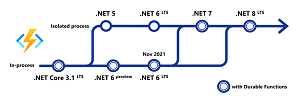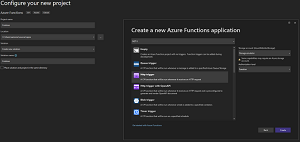News
.NET 6 Support Leads New GA Features in Azure Functions Fall Update
Microsoft announced several new features that are now generally available in the fall update of Azure Functions, used for event-driven serverless computing in the cloud.
To start off, while Azure Functions was late to the .NET 5 party, it already has full support for .NET 6, which debuted Nov. 8.
Microsoft earlier explained why Azure Functions didn't support .NET 5 until four months after it went GA on Nov. 10, 2020. "To enable .NET 5 in Azure Functions, we are moving to an out-of-process model that runs a .NET 5 worker process alongside the runtime," said the team's Anthony Chu in a blog post. "This is the same out-of-process model that all non-.NET Azure Functions languages have used successfully since Azure Functions V2."
Things have been straightened out with the release of .NET 6, so support has come much sooner, and from now on, Azure Functions support for .NET 6.0 will follow the .NET 6.0 lifecycle.
 [Click on image for larger view.] Future of .NET on Azure Functions (source: Microsoft).
[Click on image for larger view.] Future of .NET on Azure Functions (source: Microsoft).
"Azure Functions support for .NET 6.0 is now generally available in Azure Functions runtime 4.0," Microsoft's Eamon O'Reilly said in a blog post last week. ".NET 6.0 is the latest Long Term Support (LTS) version of .NET. Both the in-process and isolated models are supported in .NET 6.0 Azure Functions."
 [Click on image for larger view.] Creating a New C# Function App in .NET 6.0 in Visual Studio 2022 (source: Microsoft).
[Click on image for larger view.] Creating a New C# Function App in .NET 6.0 in Visual Studio 2022 (source: Microsoft).
Also going GA in the fall update is Azure Functions runtime 4.0, which supports these language/runtime versions:
- Node.js 14, 16 (preview)
- Python 3.7, 3.8, 3.9
- Java 8, 11
- PowerShell 7.0
- Custom handlers
Also, along with the .NET 6 support comes support for building and deploying full-stack .NET 6.0 applications as Azure Static Web Apps.
"For your app's frontend, Static Web Apps can now automatically build and deploy .NET 6.0 Blazor WebAssembly apps, including those that use advanced .NET 6.0 features like ahead-of-time (AOT) compilation," O'Reilly said. "For backend APIs, you can build and deploy .NET 6.0 Azure Functions with your static web apps. Both in-process and isolated .NET 6.0 function apps are supported."
O'Reilly also discussed Azure Functions extensions with identity-based connection support. "Identity-based connections allow you to connect with these services using an identity rather than a connection string secret that must be managed. This identity could be the managed identity of your hosted app or, when running locally, your own developer identity," he said.
Now generally available is a set of Azure Functions triggers and bindings based on the latest Azure SDKs:
Also going GA were:
- Azure Functions Python 3.9 Support
- OpenAPI extension with Azure Functions HTTP Trigger
- Availability zones for Azure Functions premium and dedicated app service plans
Along with all of the above features becoming generally available, many others have been introduced as previews, including:
- PowerShell on Linux in Azure Functions
- Node.js 16 in Azure Functions
- Dynamic concurrency in Azure Functions
- Distributed tracing for Java apps on Azure Functions Linux
- SQL Binding support
About the Author
David Ramel is an editor and writer at Converge 360.